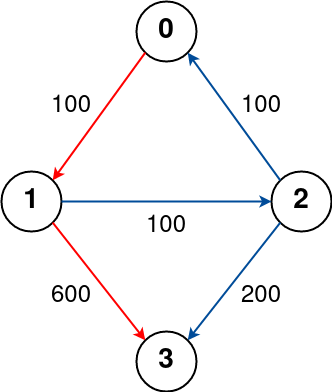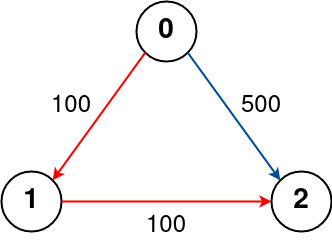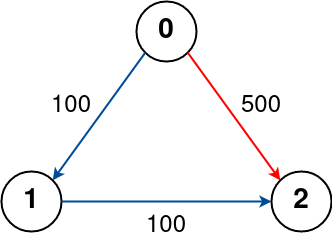Monthly Archives: April 2023
C# || How To Find The Cheapest Flights Within K Stops Using C#

The following is a module with functions which demonstrates how to find the cheapest flights within K stops using C#.
1. Find Cheapest Price – Problem Statement
There are n cities connected by some number of flights. You are given an array flights where flights[i] = [fromi, toi, pricei] indicates that there is a flight from city fromi to city toi with cost pricei.
You are also given three integers src, dst, and k, return the cheapest price from src to dst with at most k stops. If there is no such route, return -1.
Example 1:

Input: n = 4, flights = [[0,1,100],[1,2,100],[2,0,100],[1,3,600],[2,3,200]], src = 0, dst = 3, k = 1
Output: 700
Explanation:
The graph is shown above.
The optimal path with at most 1 stop from city 0 to 3 is marked in red and has cost 100 + 600 = 700.
Note that the path through cities [0,1,2,3] is cheaper but is invalid because it uses 2 stops.
Example 2:

Input: n = 3, flights = [[0,1,100],[1,2,100],[0,2,500]], src = 0, dst = 2, k = 1
Output: 200
Explanation:
The graph is shown above.
The optimal path with at most 1 stop from city 0 to 2 is marked in red and has cost 100 + 100 = 200.
Example 3:

Input: n = 3, flights = [[0,1,100],[1,2,100],[0,2,500]], src = 0, dst = 2, k = 0
Output: 500
Explanation:
The graph is shown above.
The optimal path with no stops from city 0 to 2 is marked in red and has cost 500.
2. Find Cheapest Price – Solution
The following is a solution which demonstrates how to find the cheapest flights within K stops.
|
1 2 3 4 5 6 7 8 9 10 11 12 13 14 15 16 17 18 19 20 21 22 23 24 25 26 27 28 29 30 31 32 33 34 35 36 37 38 39 40 41 42 43 44 45 46 47 48 49 50 |
// ============================================================================ // Author: Kenneth Perkins // Date: Apr 1, 2023 // Taken From: http://programmingnotes.org/ // File: Solution.cs // Description: Demonstrates how to find cheapest flights in k stops // ============================================================================ public class Solution { public int FindCheapestPrice(int n, int[][] flights, int src, int dst, int k) { var adj = new Dictionary<int, List<int[]>>(); foreach (int[] i in flights) { if (!adj.ContainsKey(i[0])) { adj[i[0]] = new List<int[]>(); } adj[i[0]].Add(new int[] { i[1], i[2] }); } int[] stops = new int[n]; Array.Fill(stops, int.MaxValue); var pq = new PriorityQueue<int[], int[]>(Comparer<int[]>.Create((a, b) => a[0] - b[0])); // {dist_from_src_node, node, number_of_stops_from_src_node} var distance = new int[] { 0, src, 0 }; pq.Enqueue(distance, distance); while (pq.Count > 0) { int[] temp = pq.Dequeue(); int dist = temp[0]; int node = temp[1]; int steps = temp[2]; // We have already encountered a path with a lower cost and fewer stops, // or the number of stops exceeds the limit. if (steps > stops[node] || steps > k + 1) { continue; } stops[node] = steps; if (node == dst) { return dist; } if (!adj.ContainsKey(node)) { continue; } foreach (int[] a in adj[node]) { var newDistance = new int[] { dist + a[1], a[0], steps + 1 }; pq.Enqueue(newDistance, newDistance); } } return -1; } }// http://programmingnotes.org/ |
QUICK NOTES:
The highlighted lines are sections of interest to look out for.
The code is heavily commented, so no further insight is necessary. If you have any questions, feel free to leave a comment below.
Once compiled, you should get this as your output for the example cases:
700
200
500












